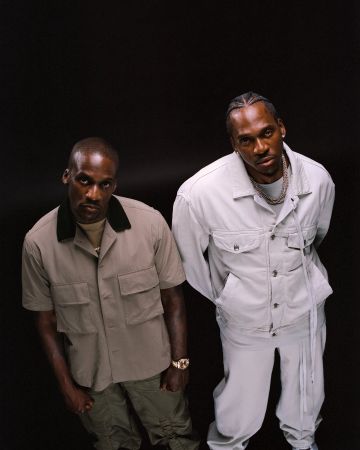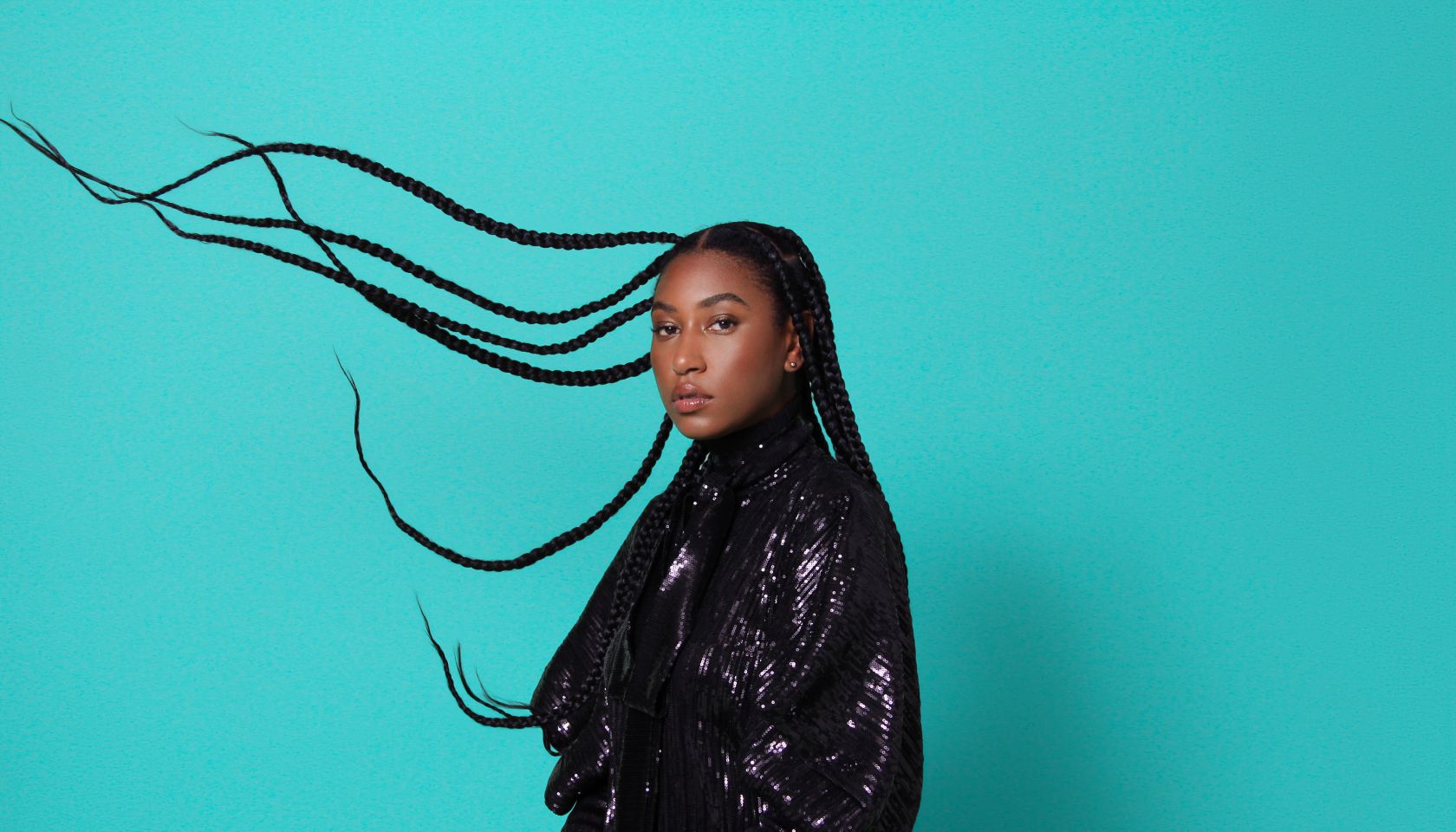Why Clipse’s New Album Speaks To Black Women [Op-Ed]
From Miscarriage To Manhood: Why Clipse’s New Album Speaks To Black Women Too [Op-Ed]

I’ve seen so many thinkpiece clips about Clipse, but none by women influencers have yet to cross my algorithm. No, I’m not going to make one of my own; I’m an essayist, not a content creator. I’m an architect of the culture of hip hop, so I’m going to add to the canon with more than a hot take. I’m Gen X, Golden Era, long-form over listicles and analog over digital. I also tend to wait until the first wave of a campaign has come and gone, and I really needed to sit with and process this complex, masterful body of work. The duo is touring now, so my article is actually right on time; see tour dates here.
Let God Sort Em Out, the reunion album from blood brothers Malice and Pusha T, was 15 years in the making. This album makes the case yet again for the power of the product when artists live their lives and then write, record and perform when they have something substantive and profound to say. This album is the hip-hop equivalent of Black Messiah by fellow Virginian D’Angelo, released 14 years after Voodoo. Both albums are dark, smooth and somehow still very layered, and absolutely worth the wait.
King Push and Malice are without dispute among the sharpest, cleanest lyricists across the genre. “I will close your heaven for the hell of it” on “Chains & Whips” invites so many interpretations with just ten words. Is he talking actual murder, or relegation to pariah status by public humiliation? Who is he talking to? From his bouts with Drake, Lil Wayne, Travis Scott and Jim Jones, we know Push doesn’t run from a battle. The declaration of opening “I will” closing with “for the hell of it” is equal parts threat, dare and promise. I feel like I can hear Push’s teeth clench upon delivery, conveying restraint borne of maturity overruling bloodthirst.
Malice’s verse on “Ace Trumpets” is just a blackout performance. He gives true rhyme aficionados an Easter egg hunt of references ranging from Gandhi and the Bible to The Lion King. Equating Lady Gaga with cocaine which is also called “white girl”—and telegraphing that she is also dope…while namechecking House of Gucci, the film she starred in? I mean, I can’t even. We need to talk more about how loaded and delicious these lines are. This album has us enraptured because of its clarity and intelligence, both in terms of Clipse being brilliant and imaginative, but also with respect to being highly emotionally intelligent.
RELATED CONTENT: 7 Rappers Who Bravely Shot Their Shot In Their Songs

”The Birds Don’t Sing” is a master class in spinning pain into gold. Here, we have grieving siblings who’ve lost their parents within months of each other, recounting intimate last moments that they could have just kept for themselves and their families. Pusha T laying bare his misplaced focus on social media and rapping instead of his mother’s wisdom, lamenting that when she was gone, he “felt it all and couldn’t function” when most “experience death and feel numbness”. Malice confessing that he had betrayed his father by choosing to move weight, when he had a present, hardworking and dutiful father. “Mine made sure he had every base covered/so imagine his pain finding base in the cupboard”. This is the vulnerability women look for from men, and its expression in present-day hip hop is rare. May this song permit other rappers to change that. May it give rap listeners permission to unpack their shortcomings and mistakes so they can embrace vulnerability as a practice. Clipse have never sounded more grounded, or more balanced.
My sisters, I know you probably cringe at how women are called all kinds of “bitches”, and our brothas are “niggas” on these songs…and how they’re rapping about polluting our own communities (and those of other folks too) with drugs, violence and death. It’s hard for me to hear, as well–even after 30 years of working with and around now legendary, equally foul-mouthed hip hop artists. Remember: the whole point of hip hop was (and is) to take the violence out of the physical realm and place it on wax, or dance it out on linoleum in the form of art. Let God Sort Em Out is a memoir; it’s confronting, uncomfortable and loud. Music is easier to lambast because it isn’t carried privately in a diary or experienced intimately in the way one consumes a book.
I for one am glad they stopped selling dope and started rhyming about it. I’m not looking for love raps from these two (definitely off-brand), but I am clear that they care about women and see us as human beings. Pusha T rhyming on “All Things Considered” about managing the heartbreak of his wife’s miscarriage, knowing their only son wanted a baby as much as they did, is a powerful receipt. Push seems to offer it as a response to an opening question from his therapist:
“How I’m doin’? All things considered/let’s be specific/my momma cheek, I miss it/I wanna kiss it/Nige [Nigel] asking for siblings/I know he meant it/V miscarried/we hid it/I’m glad he missed it”

According to the National Library of Medicine, an estimated 750,000 to one million American women miscarry annually. Despite being a common and natural medical occurrence, pregnancy loss is shrouded in silence and barely whispered about, much less rapped about by the expectant father who has to live through it. My son also wanted a sibling, and when I miscarried, he never found out. I was unable to talk about it without crying for years afterward. Never before have I felt so seen by an ex drug dealer with a microphone.
Am I giving Clipse a pass for language I don’t use in public? It is neither mine nor ours to give. Their art is not for me to police, but I will disagree with and critique it, because I know they can speak about us more creatively, and simply choose not to; it’s the only lazy thing about this album, but that goes for all rap music. I long for the days when less profane descriptions of women like ‘shorty’, ‘honey’, ‘girl’ and ‘skeezer’ were the norm. But as Pusha T and Malice reiterate throughout this boldly written, deftly produced, and destined to be classic album, their name-calling, violent drug talk, and irrelevance for what anybody has to say about it are all culturally inappropriate.
But then, so is the immediacy with which we take to the dance floor to pop it and drop it when Juvenile’s “Back That Azz Up” comes on. Am I right, or am I wrong?
Thembisa S. Mshaka is an award-winning creative campaign writer, whose former artists include Wu-Tang Clan, Nas, Wyclef Jean, Cam’Ron, Ghostface Killah, Raekwon, 50 Cent, and Will Smith. The second edition of her business title Put Your Dreams First: Handle Your [entertainment] Business (Red Sky Presents) is slated for late 2025 release.
RELATED CONTENT: Salt-N-Pepa Battle UMG For Their Masters — And Their Legacy












